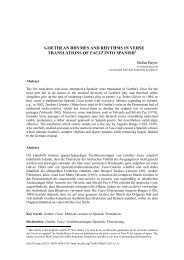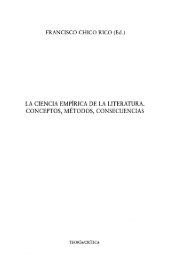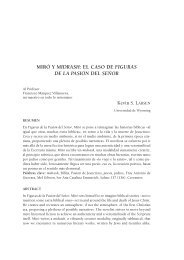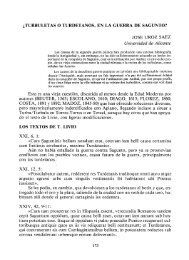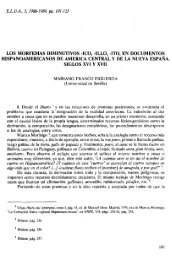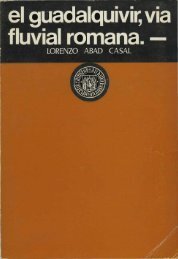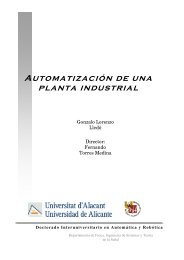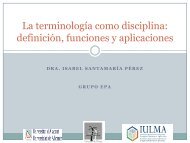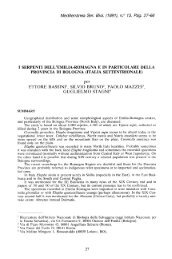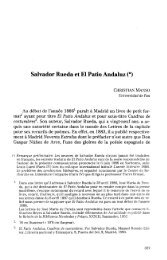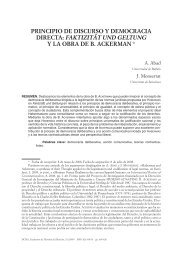- Page 1 and 2:
PUBLICACIONES DE LA UNIVERSIDAD DE
- Page 3 and 4:
Juan Francisco Mesa Sanz EL DESEO Y
- Page 5 and 6:
Portada Créditos Índice Presentac
- Page 7 and 8:
Índice 3.2.5. Volvi ..............
- Page 9 and 10:
Índice 6. El deseo y el subjuntivo
- Page 11 and 12:
El deseo y el subjuntivo ginas una
- Page 13 and 14:
El deseo y el subjuntivo caso, sí
- Page 15 and 16:
ÍNDICE El deseo y el subjuntivo pa
- Page 17 and 18:
1. Introducción ÍNDICE El deseo y
- Page 19 and 20:
El deseo y el subjuntivo un extraor
- Page 21 and 22:
El deseo y el subjuntivo lugar a to
- Page 23 and 24:
El deseo y el subjuntivo El estudio
- Page 25 and 26:
El deseo y el subjuntivo El trabajo
- Page 27 and 28:
El deseo y el subjuntivo por medio
- Page 29 and 30:
El deseo y el subjuntivo torio de l
- Page 31 and 32:
El deseo y el subjuntivo Lo que dic
- Page 33 and 34:
ÍNDICE El deseo y el subjuntivo re
- Page 35 and 36:
El deseo y el subjuntivo la actitud
- Page 37 and 38:
potin es mihi uerum dicere ? ÍNDIC
- Page 39 and 40:
El deseo y el subjuntivo timo const
- Page 41 and 42:
El deseo y el subjuntivo tivos con
- Page 43 and 44:
El deseo y el subjuntivo sis por el
- Page 45 and 46:
El deseo y el subjuntivo el modo ve
- Page 47 and 48:
El deseo y el subjuntivo 1 Remitimo
- Page 49 and 50:
El deseo y el subjuntivo lo dejan d
- Page 51 and 52:
El deseo y el subjuntivo 25 LEVINSO
- Page 53 and 54:
El deseo y el subjuntivo er’s int
- Page 55 and 56:
El deseo y el subjuntivo 2. El subj
- Page 57 and 58:
El deseo y el subjuntivo análisis
- Page 59 and 60:
El deseo y el subjuntivo los deseos
- Page 61 and 62:
El deseo y el subjuntivo Los hechos
- Page 63 and 64:
El deseo y el subjuntivo aspectos t
- Page 65 and 66:
El deseo y el subjuntivo ción con
- Page 67 and 68:
El deseo y el subjuntivo propo sici
- Page 69 and 70:
El deseo y el subjuntivo deseo pued
- Page 71 and 72:
El deseo y el subjuntivo lengua com
- Page 73 and 74:
(iv) Vtinam modo, modo ut: ÍNDICE
- Page 75 and 76:
El deseo y el subjuntivo no-, marca
- Page 77 and 78:
El deseo y el subjuntivo Los tres a
- Page 79 and 80:
El deseo y el subjuntivo ita di fac
- Page 81 and 82:
El deseo y el subjuntivo los hechos
- Page 83 and 84:
El deseo y el subjuntivo 8 Ya hemos
- Page 85 and 86:
El deseo y el subjuntivo 21 Ter. An
- Page 87 and 88:
3. Los verbos volitivos ÍNDICE El
- Page 89 and 90:
El deseo y el subjuntivo nuevo el d
- Page 91 and 92:
El deseo y el subjuntivo Bennett (1
- Page 93 and 94:
El deseo y el subjuntivo No obstant
- Page 95 and 96:
El deseo y el subjuntivo de esta re
- Page 97 and 98:
El deseo y el subjuntivo uolo delud
- Page 99 and 100:
El deseo y el subjuntivo CL. nolo a
- Page 101 and 102:
El deseo y el subjuntivo dado prác
- Page 103 and 104:
El deseo y el subjuntivo nunc ego S
- Page 105 and 106:
El deseo y el subjuntivo aparición
- Page 107 and 108:
El deseo y el subjuntivo principio
- Page 109 and 110:
El deseo y el subjuntivo El segundo
- Page 111 and 112:
El deseo y el subjuntivo se com pru
- Page 113 and 114:
El deseo y el subjuntivo AE. pater,
- Page 115 and 116:
El deseo y el subjuntivo todo, junt
- Page 117 and 118:
ÍNDICE El deseo y el subjuntivo to
- Page 119 and 120:
El deseo y el subjuntivo El anális
- Page 121 and 122:
El deseo y el subjuntivo siempre of
- Page 123 and 124:
El deseo y el subjuntivo edepol o,
- Page 125 and 126:
ÍNDICE El deseo y el subjuntivo ne
- Page 127 and 128:
El deseo y el subjuntivo Pl. Amph.
- Page 129 and 130:
ÍNDICE El deseo y el subjuntivo po
- Page 131 and 132:
ÍNDICE El deseo y el subjuntivo Vo
- Page 133 and 134: ÍNDICE El deseo y el subjuntivo co
- Page 135 and 136: El deseo y el subjuntivo el deseo s
- Page 137 and 138: El deseo y el subjuntivo Cic. Fam.
- Page 139 and 140: ÍNDICE El deseo y el subjuntivo co
- Page 141 and 142: El deseo y el subjuntivo sidera con
- Page 143 and 144: El deseo y el subjuntivo El caráct
- Page 145 and 146: 3.2.6. Conclusiones ÍNDICE El dese
- Page 147 and 148: El deseo y el subjuntivo 3.3. Los c
- Page 149 and 150: El deseo y el subjuntivo ca, dando
- Page 151 and 152: El deseo y el subjuntivo el esclavo
- Page 153 and 154: PH. amn tandem? ÍNDICE El deseo y
- Page 155 and 156: ÍNDICE El deseo y el subjuntivo En
- Page 157 and 158: El deseo y el subjuntivo Illud quid
- Page 159 and 160: El deseo y el subjuntivo hoc quam v
- Page 161 and 162: ÍNDICE El deseo y el subjuntivo pe
- Page 163 and 164: ÍNDICE El deseo y el subjuntivo la
- Page 165 and 166: El deseo y el subjuntivo carácter
- Page 167 and 168: El deseo y el subjuntivo El acto de
- Page 169 and 170: El deseo y el subjuntivo O Libane,
- Page 171 and 172: El deseo y el subjuntivo 3.3.2.1.2.
- Page 173 and 174: El deseo y el subjuntivo atque hoc
- Page 175 and 176: El deseo y el subjuntivo se haga) a
- Page 177 and 178: El deseo y el subjuntivo La estruct
- Page 179 and 180: El deseo y el subjuntivo aquel esta
- Page 181 and 182: El deseo y el subjuntivo ción del
- Page 183: El deseo y el subjuntivo 1 PINKSTER
- Page 187 and 188: El deseo y el subjuntivo 29 RISSELA
- Page 189 and 190: El deseo y el subjuntivo 44 Sin que
- Page 191 and 192: El deseo y el subjuntivo 60 Se une
- Page 193 and 194: 81 PINKSTER, 1995: 300. ÍNDICE El
- Page 195 and 196: El deseo y el subjuntivo uellem, ma
- Page 197 and 198: El deseo y el subjuntivo 113 BUSTOS
- Page 199 and 200: El deseo y el subjuntivo tion asid
- Page 201 and 202: El deseo y el subjuntivo 140 Seguim
- Page 203 and 204: 4. Los verbos cupitivos ÍNDICE El
- Page 205 and 206: ÍNDICE El deseo y el subjuntivo So
- Page 207 and 208: El deseo y el subjuntivo otros tér
- Page 209 and 210: El deseo y el subjuntivo vo, expete
- Page 211 and 212: 4.2. La estructura del deseo ÍNDIC
- Page 213 and 214: ÍNDICE El deseo y el subjuntivo Ot
- Page 215 and 216: El deseo y el subjuntivo El context
- Page 217 and 218: El deseo y el subjuntivo 4.2.1.2. E
- Page 219 and 220: El deseo y el subjuntivo El acto de
- Page 221 and 222: El deseo y el subjuntivo presente d
- Page 223 and 224: El deseo y el subjuntivo PA. Mysis,
- Page 225 and 226: El deseo y el subjuntivo Finalmente
- Page 227 and 228: El deseo y el subjuntivo Finalmente
- Page 229 and 230: El deseo y el subjuntivo do tambié
- Page 231 and 232: El deseo y el subjuntivo uso se apr
- Page 233 and 234: El deseo y el subjuntivo subjuntivo
- Page 235 and 236:
El deseo y el subjuntivo en el prim
- Page 237 and 238:
El deseo y el subjuntivo O incluso
- Page 239 and 240:
El deseo y el subjuntivo tipo; cons
- Page 241 and 242:
El deseo y el subjuntivo les el enu
- Page 243 and 244:
El deseo y el subjuntivo de nuevo u
- Page 245 and 246:
ÍNDICE El deseo y el subjuntivo 4.
- Page 247 and 248:
El deseo y el subjuntivo nisi ut pe
- Page 249 and 250:
El deseo y el subjuntivo mas uiso/u
- Page 251 and 252:
El deseo y el subjuntivo (ii) con s
- Page 253 and 254:
quaeso, nonne intellegis? quaeso qu
- Page 255 and 256:
El deseo y el subjuntivo Quaeso, en
- Page 257 and 258:
El deseo y el subjuntivo Es decir,
- Page 259 and 260:
El deseo y el subjuntivo Así pues,
- Page 261 and 262:
El deseo y el subjuntivo 5 RISSELAD
- Page 263 and 264:
El deseo y el subjuntivo 20 Se unen
- Page 265 and 266:
El deseo y el subjuntivo 37 No cree
- Page 267 and 268:
El deseo y el subjuntivo con todos
- Page 269 and 270:
El deseo y el subjuntivo 64 En todo
- Page 271 and 272:
El deseo y el subjuntivo 79 Séneca
- Page 273 and 274:
El deseo y el subjuntivo 5.1. Las p
- Page 275 and 276:
El deseo y el subjuntivo afi rmaci
- Page 277 and 278:
El deseo y el subjuntivo Adnue: sic
- Page 279 and 280:
El deseo y el subjuntivo Es posible
- Page 281 and 282:
El deseo y el subjuntivo independen
- Page 283 and 284:
El deseo y el subjuntivo abstulis h
- Page 285 and 286:
El deseo y el subjuntivo (...) opta
- Page 287 and 288:
El deseo y el subjuntivo En primer
- Page 289 and 290:
El deseo y el subjuntivo riva la op
- Page 291 and 292:
El deseo y el subjuntivo En consecu
- Page 293 and 294:
El deseo y el subjuntivo y es de no
- Page 295 and 296:
El deseo y el subjuntivo cual no de
- Page 297 and 298:
El deseo y el subjuntivo oración e
- Page 299 and 300:
El deseo y el subjuntivo apuntado q
- Page 301 and 302:
ÍNDICE El deseo y el subjuntivo (i
- Page 303 and 304:
El deseo y el subjuntivo Cic. Planc
- Page 305 and 306:
El deseo y el subjuntivo dríamos e
- Page 307 and 308:
El deseo y el subjuntivo a las pala
- Page 309 and 310:
ÍNDICE El deseo y el subjuntivo 1
- Page 311 and 312:
El deseo y el subjuntivo En todos e
- Page 313 and 314:
El deseo y el subjuntivo perfecto,
- Page 315 and 316:
El deseo y el subjuntivo El último
- Page 317 and 318:
El deseo y el subjuntivo tario, las
- Page 319 and 320:
ÍNDICE El deseo y el subjuntivo Pr
- Page 321 and 322:
El deseo y el subjuntivo Séneca, e
- Page 323 and 324:
El deseo y el subjuntivo utrumque f
- Page 325 and 326:
El deseo y el subjuntivo en relaci
- Page 327 and 328:
utinam id sit quod spero! ÍNDICE E
- Page 329 and 330:
El deseo y el subjuntivo De urbanis
- Page 331 and 332:
El deseo y el subjuntivo illud dole
- Page 333 and 334:
El deseo y el subjuntivo Cic. Att.
- Page 335 and 336:
El deseo y el subjuntivo O claramen
- Page 337 and 338:
ÍNDICE El deseo y el subjuntivo en
- Page 339 and 340:
1 BASSOLS, 1948: 464. ÍNDICE El de
- Page 341 and 342:
El deseo y el subjuntivo 20 Pl. Poe
- Page 343 and 344:
El deseo y el subjuntivo 38 GRO (19
- Page 345 and 346:
El deseo y el subjuntivo 61 La auto
- Page 347 and 348:
El deseo y el subjuntivo 77 Más si
- Page 349 and 350:
El deseo y el subjuntivo 93 En el r
- Page 351 and 352:
El deseo y el subjuntivo 6. El dese
- Page 353 and 354:
El deseo y el subjuntivo En cuanto
- Page 355 and 356:
El deseo y el subjuntivo esta rique
- Page 357 and 358:
El deseo y el subjuntivo que introd
- Page 359 and 360:
El deseo y el subjuntivo y los asoc
- Page 361 and 362:
El deseo y el subjuntivo algo más:
- Page 363 and 364:
7. Bibliografía ÍNDICE El deseo y
- Page 365 and 366:
El deseo y el subjuntivo BOSQUE, Ig
- Page 367 and 368:
El deseo y el subjuntivo ESCANDELL
- Page 369 and 370:
El deseo y el subjuntivo HEIM, Iren
- Page 371 and 372:
El deseo y el subjuntivo KURYLowICZ
- Page 373 and 374:
El deseo y el subjuntivo MELLET, Sy
- Page 375 and 376:
El deseo y el subjuntivo NUTTING, H
- Page 377 and 378:
El deseo y el subjuntivo PRAT, L.,
- Page 379 and 380:
El deseo y el subjuntivo SINCLAIR,
- Page 381 and 382:
El deseo y el subjuntivo Ediciones
- Page 383 and 384:
El deseo y el subjuntivo 1 Como nor
- Page 385 and 386:
El deseo y el subjuntivo Índice de
- Page 387 and 388:
II, 9, 4. Sal. 9. Sen. 19. 85. Tusc
- Page 389 and 390:
312. 486. 587. 613. Trin. 23-6. 88.





